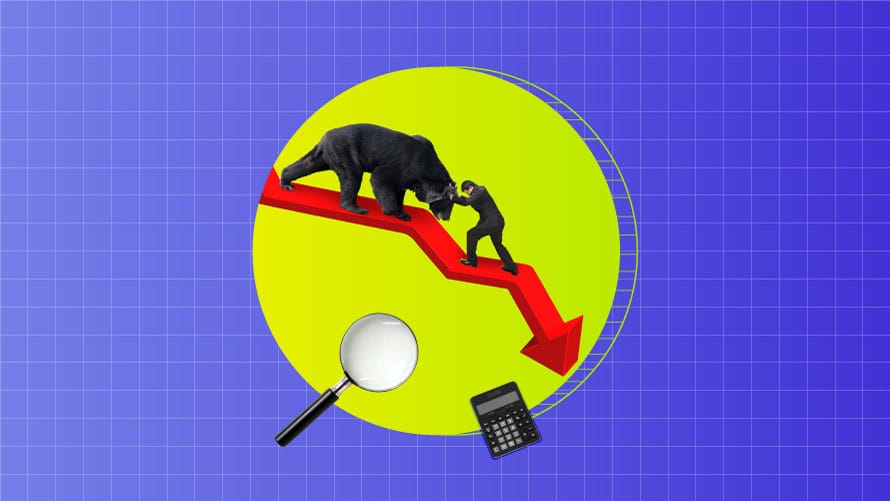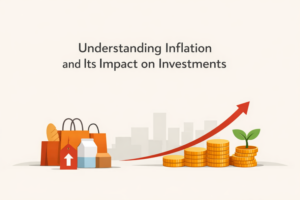Are we in a bear market? Should you be worried about the bear market?

The Indian stock market has been volatile for the past few months. The benchmark indices are down about 13% from their all-time highs, with discussions around heated valuations again gaining steam. Adding to the Indian market volatility are concerns about the depreciating rupee, expectations of slower rate cuts in the US in 2025, and fear of US trade tariffs, fanning investor concerns that the bear market is upon us. This blog post will do a reality check and evaluate various factors at play in the market.
Keeping tabs on market developments
Foreign institutional and portfolio investors have been net sellers as the strengthening US dollar and high interest rates in the US make the American stock market a lucrative choice.
If market experts are correct, the Indian equity markets might decline further in the coming months before stabilizing at reasonable valuations. A lot is being said about equity and mutual fund investments. Being fearful or doubting your investment decisions is quite normal in uncertain times. Should you be worried about this bear market? Or should you just continue investing and not look at the market in the short term for better long-term gains?
While investment experts agree that time in the market is better than timing the market, there is no one-solution-fits-all-kind answer to who should be worried about the bear market.
The course of action will depend on factors such as age, investment horizon, and portfolio allocation. Here is a guide to evaluating your portfolio in the current market situation and acting accordingly.
Financial Planning Lifecycle
Wealth accumulation
- This is the stage where you start your career and financial planning journey.
- At this point, it’s all about saving and planning for the future, which means this is also where retirement planning should ideally begin.
Wealth preservation
- This is when the financial planning foundations are all in place, and it’s time to preserve your wealth.
- Here, an individual begins to consider retirement planning following years of wealth accumulation in working life.
- This is also the stage to re-evaluate investments and realign the portfolio to match the family’s financial needs for the coming years.
Wealth distribution
- This is the final stage when it’s time to reap the benefits of your savings and investments.
- For most people, these will be their retirement years; hence, it is crucial to ensure that the accumulated corpus lasts till the end of your and your dependent’s lives.
- People would also take estate planning seriously at this stage.
We have mentioned the three distinct stages of life, and how you deal with a bear market should depend on your lifecycle stage.
Optimal asset allocation rule
Rule of 100: Subtract your age from 100 to arrive at the percentage of equity investment.
Eg: 100 – 25, i.e. you can have 25% in debt and 75% in equity
Investment rule of thumb
You shouldn’t worry about the bear phase if your investment horizon is five years or more.
One should keep the optimal asset allocation rule and investment thumb rule in mind while evaluating investments.
Difference between Panic Selling and Booking a Loss
Note that panic selling and booking losses are not the same:
- Booking a loss: For instance, you identify speculative investments while evaluating your portfolio. These have weak fundamentals; if you decide to sell them, this can be classified as booking a loss. In a nutshell, loss booking is an informed decision taken rationally.
- Panic Selling: The market has corrected almost 13% from its all-time high. You check your portfolio and see that a stock has lost 10% in a single day. You panic and sell the stock without checking its fundamentals or doing research. This is a classic example of a panic sale.
While panic selling is discouraged by veteran equity investors, loss booking is often talked about positively as it helps correct portfolio allocation mistakes, improving returns in the long run.
Equity and mutual fund investors should consider the difference between loss booking and panic selling before evaluating their investment portfolio.
Financial Planning Lifecycle Stage and Bear Markets
Here is how you should deal with the bear market depending on your age and your lifecycle stage:
Age 25 to 45 years – Accumulation Stage
Investors under 45 are in the accumulation stage of their lives, focusing on building a solid financial foundation for their future.
Age 25 to 35 years
Investments are a marathon and not a sprint. Young individuals have the luxury of time to let compounding do its magic. Therefore, bear markets should not cause worry or panic for young people between the ages of 25 to 35.
How to Deal with Bear Market?
Here are the steps that you can follow to safeguard your investments while supercharging your portfolio for the years to come –
- Evaluate your portfolio.
- Identify speculative, high-risk investments in your portfolio. This can be both equities and mutual funds.
- Research the highlighted high-risk investments.
- If the identified investments have weak fundamentals, you could consider booking your losses.
- Reallocate the freed-up cash to stable options such as index or flexi-cap funds.
- Sit back, hold tight, and do not panic sell the rest of your portfolio.
Age 36 to 45 years
This age cohort might have a larger accumulated capital compared 20s to early 30s age group. Moreover, this might not be your first bear market, and you know that equity markets are cyclical.
While you might have a larger capital base, your expenses might also have increased as you would have a young dependent family or might be planning to start a family, which might entail fixed costs such as schooling. These developments may make you angsty seeing the recent bear market. Here is how you can deal with this bear market.
How to Deal with Bear Market?
- It is time to start following the optimal asset allocation rule. Subtract your age from 100 to arrive at the weight of equity investments in your portfolio. The rest should be fixed-income securities and debt.
- If you haven’t started the fixed income shift, you may start it now.
- Evaluate your portfolio, and liquidate your speculative investments.
- The index funds and large-cap investments are relatively safe and can stay. But, if you have a significant allocation to mid- and small-caps, you can evaluate these investments closely and liquidate some of the investments to free up cash.
- Move this freed-up cash to debt mutual funds to preserve capital.
- Alternatively, you can also invest in investment-grade listed corporate bonds to generate regular income from your investments.
- This regular income will help you fund your fixed expenses, such as school fees for your kids.
Adding fixed-income securities to your portfolio will help you safeguard your equity investments in the long run. This is because the stable interest income generated by listed bonds will provide a stable passive income, helping fund your extra expenses so that you don’t have to touch your equity investments.
The equity portion of your portfolio will help you create wealth over time, whereas the debt portion of your portfolio can help you meet your additional expenses, or the interest income can be reinvested in equity to increase capital.
Age 46 to 60 – Capital Preservation Stage
Your responsibilities, income, expenses, and investments have all grown with time in your mid-40s. Your risk profile might also have changed as you age. For someone in their late 40s, this bear market should be an eye-opener vis-a-vis your changing risk perception.
Moreover, you might now have pressing fixed expenses such as kids getting ready for college, increased medical expenses of dependent parents, and home loan EMIs.
You have done your financial planning and have saved up for your kids’ college fees. However, in a volatile market, your need for money for expenses might weigh heavily, as overdrawing from your savings might hamper your retirement planning.
Regular income-generating investments, such as adding listed investment-grade fixed-income securities to your portfolio, can help. Here is how you can re-evaluate your portfolio to deal with the bear market –
How to Deal with Bear Market?
- Evaluate all your existing investments, including equity, mutual funds, debt, fixed-income securities, and gold.
- If your portfolio is away from optimal allocation according to your age, re-evaluate the speculative investments and check if the risk of those investments still aligns with your risk appetite.
- Revaluation and rebalancing should be done even if you have enough investment in debt because this will help you align your investments with your current risk tolerance.
- If a specific portion of your portfolio is in losses and the risk posed by those investments does not align with your future goal, it is advisable to liquidate those investments.
- While booking a loss is not a very popular investment strategy and the risk-averse nature of humans makes it difficult to implement, investment veterans think booking your losses at the right time and redeploying the freed-up capital can help stabilize your portfolio and increase returns over time.
- As someone in their late 40s or early 50s approaches retirement in a decade or so, you can reinvest your portfolio, rebalancing proceeds in fixed-income securities and high dividend yield stocks.
- Generating passive income from your investments will help you meet your increased expenses without disturbing the equity investment you hold for your retirement.
The bear markets are bad in the short run, but markets are cyclical by nature. In fact, history is witness to the disproportional nature of bear market losses vs. bull market gains. Middle-agers would benefit if they see this bear market as an investment misstep correction exercise and take appropriate steps to correct their allocation mistakes. This can set them up firmly for retirement, which might be a decade away.
Age 60 and above – Wealth Distribution Stage
You are in the golden years of your life. You have planned your retirement and have created enough wealth to support your lifestyle for the coming years. If you have been an equity investor for a long time, this bear market will not alarm you, as you have seen multiple bear markets over the years with drawdowns as large as 30% from the highs.
Retirement is when income stops partially or completely, and your expenses remain steady. This is the reason why you need cash flow-generating investments in your portfolio.
If you are an astute investor, you might have begun the switch from equity to debt securities and now you only hold a small portion of your investments in equity assets.
But what if equity is still a major portion of your portfolio and parked in high-risk equity investments such as small-cap and mid-cap stocks? If you are worried about market downturns, here is how to deal with the bear market to safeguard your retirement.
How to Deal with Bear Market?
- Evaluate your investment portfolio and your retirement corpus needs.
- If your accumulation is falling short of meeting your retirement corpus needs, you can delay your retirement by a few years until you make up for the shortfall in your retirement corpus. This will help you have a peaceful retirement.
- Ideally, you should have 55% to 60% of your investments in debt funds. If this is not the case, don’t worry. Take a closer look at your investments and evaluate them all.
- Highlight all high-risk investments in your portfolio.
- Evaluate them closely and liquidate the ones that have a disproportionate risk-return profile.
- Freed-up capital can be invested in safer assets such as fixed-income securities and fixed deposits for senior citizens as they give a higher interest rate.
- It would also be the right time to book fixed deposits as the RBI has started the rate cut cycle and the FD interest rates will come down as the overall interest rates come down in the economy.
- If you have a residential property, you can explore reverse mortgage options to generate regular income in your retirement years.
- If you have accumulated corpus in relatively stable mutual funds such as debt funds, hybrid funds, or index funds, you can explore Systematic Withdrawal Plans to generate regular cash inflows.
- Be very careful, as there is no room for mistakes at this stage in your life. Do not hesitate to seek the help of a professional financial advisor if you are not sure about your investment decisions.
Bear markets can be daunting, especially when retirement approaches. It is always wise to be conservative and preserve capital to enjoy the fruits of your labor in your golden years.
Conclusion
By definition, a bear market is when markets are down around 20% from their last highs. Currently, the Indian equity market is down around 13% after a prolonged bull market. The financial media is buzzing with chatter about more corrections to follow. While no one can predict when the market will bottom out, it is always advisable to be safe than sorry. We have discussed ways in which different age groups can safeguard their investments. These guidelines should help investors make the most of the bear market and emerge stronger from this market downturn.
Disclaimer
The stocks mentioned in this article are not recommendations. Please conduct your own research and due diligence before investing. Investment in securities market are subject to market risks, read all the related documents carefully before investing. Please read the Risk Disclosure documents carefully before investing in Equity Shares, Derivatives, Mutual fund, and/or other instruments traded on the Stock Exchanges. As investments are subject to market risks and price fluctuation risk, there is no assurance or guarantee that the investment objectives shall be achieved. Lemonn (Formerly known as NU Investors Technologies Pvt. Ltd) do not guarantee any assured returns on any investments. Past performance of securities/instruments is not indicative of their future performance.







